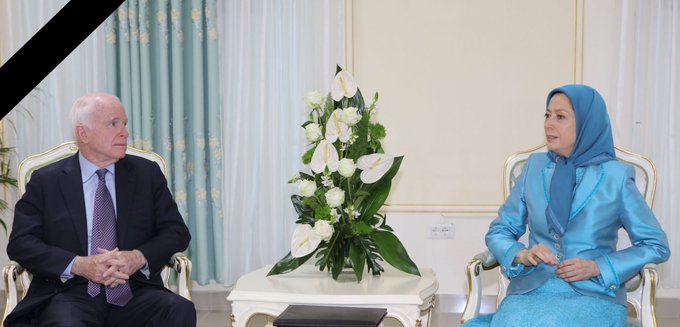A PMOI/MEK resistance unit
Analysis by PMOI/MEK
Iran, Aug. 30, 2018 - The state-run “Baharestaneh” website in Iran, associated to Iranian regime Supreme Leader Ali Khamenei, posted the following article on August 28th, indicating the mullahs’ utter fear of the Iranian opposition People's Mojahedin Organization of Iran (PMOI/MEK).
“It is necessary to take a look at the differences the PMOI/MEK have implemented in their tactics these days in comparison to the Dec/Jan uprising period. For some times now, the PMOI/MEK launched a coordinated chorus indicating the Islamic Republic of Iran is in its final phase. Cyberspace has the role of providing back-up fire in this regard… The PMOI/MEK have changed their tactic now and the protests, even in comparison to the Dec/Jan period, have surpassed an undeniable reality...
“It is worth taking the time and looking at the differences in the PMOI/MEK today in comparison to Dec/Jan:
“1. In the past, the PMOI/MEK were known to ride waves. Today, however, they have infiltrated into many social sectors and among people from all walks of life, including truck drivers, bazaar store owners, people whose life savings have been stolen by state-run firms, teachers, workers and … and [PMOI/MEK] are guiding them in their protests.
“2. The nature of today’s protests have changed. For example, in the past it would take one or two days for social/economic chants to evolve into [anti-regime] slogans. Today, however, this transition is quickly turned into a political demonstration and slogans change into [anti-regime] chants.
“3. During the Dec/Jan period the protesters were unorganized and lacked leadership. There were vivid leadership mistakes on the ground and the movement lacked the necessary complexity. Today, however, in addition to gaining a gangster-like and aggressive spirit, [the protests] have the potential of establishing bunkers and shields in the streets in the case of a faceoff with security forces. This means the protesters are far more ready these days.
“4. Protesters, with the PMOI/MEK topping the list, lack any political reservations. They do not recognize any factional divisions inside the [Iranian regime] and they put the same amount of energy in their slogans against reformists as they do against principalists.
“5. The PMOI/MEK’s role in the Dec/Jan uprising is so undeniable that the Supreme Leader said in his January 9th speech: ‘A triangle was active in this regard… The PMOI/MEK were the third side of this triangle.”
“Currently, the fact that protesters are becoming organized is a game-changing factor in comparison to the Dec/Jan uprising. They have established entities dubbed ‘Resistance Units’ that are able to increase their numbers and have the potential of replacing leaders at the scene of protests [in case of arrests]!
“However, the most significant development is the linkage between these units to their leadership. Currently, these resistance units are receiving their guidance from Massoud Rajavi in the form of ‘Message to Resistance Units.’
“On August 2nd of this year Massoud Rajavi sent a message titled, ‘Fist with fist, attack with attack, fire with fire’ to lift the protesters’ spirits, promising them these protests will continue and expand with each passing day. He described the protests as more organized in comparison to the past, claiming the [regime] lacks the capacity to confront these measures.
“Now that the enemy of the state, with such an apparatus, has prepared for a confrontation, we must acknowledge the fact that we are all in the same boat. Therefore, one must tell all government officials and the associated others that the status quo is a very serious threat that one cannot easily neglect.”
This text, posted in an article associated to Khamenei himself, vividly describes the dire situation of Iran’s regime and how the mullahs’ entire apparatus is literally crippled in the face of escalating protests across the country, especially with PMOI/MEK resistance units galvanizing and spearheading these efforts to target the regime’s core entities.









